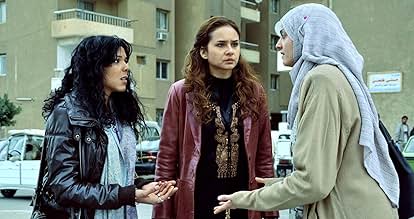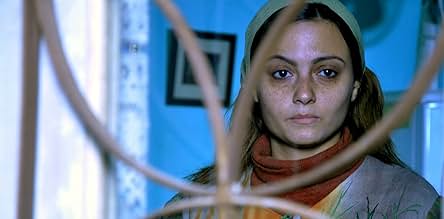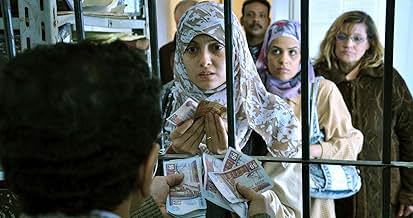IMDb RATING
7.4/10
4.9K
YOUR RATING
Unfolds the poignant story of three women and their search for justice from the daily plight of sexual harassment in Egypt.Unfolds the poignant story of three women and their search for justice from the daily plight of sexual harassment in Egypt.Unfolds the poignant story of three women and their search for justice from the daily plight of sexual harassment in Egypt.
- Awards
- 9 wins & 5 nominations total
Basem Samrah
- Adel
- (as Bassem Samra)
Ahmad El-Fishawi
- Sherif
- (as Ahmed El Feshawy)
- Director
- Writer
- All cast & crew
- Production, box office & more at IMDbPro
Featured reviews
This is one of the very few films that talks about the sexual harassment that women suffer in Egypt or the middle east.
The plot of this film is so good, the way it talks about different kinds of women and how they react to such incidents and how the others around them including their husbands, siblings, friends and parents are affected too.
The performances in this film are outstanding from all the cast especially Bushra, the directing is good and this film was one of the main reasons I follow Mohamed Diab.
It's sad to see such a movie not getting so much recognition from the public in Egypt as other movies but it definitely has its own place between critically acclaimed films of all time here in the middle east.
The plot of this film is so good, the way it talks about different kinds of women and how they react to such incidents and how the others around them including their husbands, siblings, friends and parents are affected too.
The performances in this film are outstanding from all the cast especially Bushra, the directing is good and this film was one of the main reasons I follow Mohamed Diab.
It's sad to see such a movie not getting so much recognition from the public in Egypt as other movies but it definitely has its own place between critically acclaimed films of all time here in the middle east.
Three women of different social backgrounds decide to fight back after being the victims of repeated assaults by men in the street or in the bus. This movie manages to address the delicate issue of sexual assaults on women in a very interesting way: each character has a unique standpoint and no moral judgment is imposed in the end. There is a little zest of comedy in the tragedy, some truly powerful and positive moments, and despite some stereotypical characters, the film avoids caricature. The three heroines are credible and endearing. Their relationships with men are complex, and it is hard not to ask yourself: What would I do if I faced the same challenges as they face? A perfect movie to watch on 8 March... International Women's Day.
Director Mohamed Diab shoots excellent scenes and has an intelligent perspective on storytelling.
Sexual harrastment is, unfortunatelty, a terrible matter in conservative patriarchial societies by the context of daily lives of women, civil laws and psychological boundaries. Diab not only gifts a good cinematography but also interferes an actual defection of modern society. This movie is one of important parts of survival against sexual harrasment in Egypt. Recently after the movie Egyptian governers had to create new laws punishing the sexual harrasment. Greet to Diab and bravely resisting Egyptian women!!
Sexual harrastment is, unfortunatelty, a terrible matter in conservative patriarchial societies by the context of daily lives of women, civil laws and psychological boundaries. Diab not only gifts a good cinematography but also interferes an actual defection of modern society. This movie is one of important parts of survival against sexual harrasment in Egypt. Recently after the movie Egyptian governers had to create new laws punishing the sexual harrasment. Greet to Diab and bravely resisting Egyptian women!!
The Egyptian movie, [678], which covers the subject of sexual harassment, is famous enough in Egypt today as it is. I must admit, from watching just the trailer, I took note of the genius performance and superb artistic delivery, but I also got the impression that the presentation may be overdramatizing the subject, or emotionally taking the side of women in a biased & exaggerated way, or completely ignoring the effect of the sometimes sexually provocative presentation of women when it happens in a society like the Egyptian one—this impression couldn't be more wrong. What I found while watching the movie was one of the most heartwarming and pleasant surprises I've ever come across in the history of Egyptian cinema; no exaggeration, my friend. 678 draws you into a fascinatingly complex, interconnected, and rich world. 678 allows you to meet—and literally live with—such fresh, yet believable characters. 678 turns your head toward a bitter reality, in a harsh real world, yet soothes you with regular chuckles, and keeps you interested, bothered, engaged, and hopeful.
Every main cast member did a great job in my opinion, but I must say that Bushra clearly stands out; and I'm don't want to disappoint—or be unfair to—other cast members, especially Nelly Kareem with a main character, by saying that this is only due to Bushra's genius performance; Bushra's performance was indeed fascinating, but she was also very lucky, because the other genius, Muhammad Diab, the writer and director of 678, gave Bushra his best character! Faiza, the character that Bushra plays, like a sad yet powerful tune in a beautiful song, is an unprecedented character in Egyptian cinema; and I wouldn't be exaggerating if I said that Faiza may revolutionize Egyptian cinema, or be the spark of such a creative, artistic revolution, where the voice of the observant Muslim for the first time ever gets delivered honestly, neutrally, fairly, and in a balanced and beautiful way. Faiza is one of the most believable characters I've ever gotten to know in a story, and easily my favorite hero in 678's world; and I thank the two geniuses, Muhammad Diab and Bushra, for giving us and giving Egyptian cinema—and the world—such a memorable, lovable, and very real character.
Diab managed to turn Faiza into an irresistibly charming, unlikely hero (or heroine!), with all her ups & downs, good deeds & mistakes, kindness & anger, loudness & silence, courage & fear; simply put, Faiza is so perfectly imperfect. Even her arguments with her husband were believable and convincing—within the context of the Egyptian society and that social class; and Diab did not take sides, and did not try to emotionally blackmail you into taking sides either. In many situations, Diab makes you wonder who to blame—if you are a balanced person yourself and you can empathize with the culture, religion and challenges; makes it challenging for you to be biased, and thus subtly invites you to appreciate the complexity and individual challenges in this realistic world.
The only truly "bad guy" in 678 is the sexual harasser; Diab's message is clear about this, especially because he shows you the far reaching effects and chain reaction that the harasser's actions go through to eventually produce so much misery and evil within society; but Diab also makes at least one subtle hint to discourage you from completely demonizing the harasser, and to send the message that almost any human being is fallible. Diab also doesn't shy away from shocking you (and his best character, Faiza!) by giving a minority of women a share of the blame; while empowering all women throughout the movie to take a courageous share of the responsibility of curing society of the phenomenon of sexual harassment.
If you will watch one movie to understand a bit about the Egyptian society—as it is today, without exaggerations or embellishment, in ways that focus on the phenomenon of sexual harassment, yet still ooze with variety, and ways that dig much deeper and beyond socially and emotionally; if you will watch one movie to see a believable example of a simple observant Muslim woman, struggling with real issues in her own society, a movie that doesn't even expose any actress (or your eyes) to violence, rape, or the likes, while simultaneously making what is happening clear to you with such elegance and genius; if you will watch one foreign movie that does not take sides when it comes to religion or gender, makes it challenging for you to take sides when you see how these people think and treat each other, a movie that tackles serious issues rationally and intelligently; then this one movie is 678. Find it; and watch it! Watch it this weekend.
—Yaseen Rocca
Every main cast member did a great job in my opinion, but I must say that Bushra clearly stands out; and I'm don't want to disappoint—or be unfair to—other cast members, especially Nelly Kareem with a main character, by saying that this is only due to Bushra's genius performance; Bushra's performance was indeed fascinating, but she was also very lucky, because the other genius, Muhammad Diab, the writer and director of 678, gave Bushra his best character! Faiza, the character that Bushra plays, like a sad yet powerful tune in a beautiful song, is an unprecedented character in Egyptian cinema; and I wouldn't be exaggerating if I said that Faiza may revolutionize Egyptian cinema, or be the spark of such a creative, artistic revolution, where the voice of the observant Muslim for the first time ever gets delivered honestly, neutrally, fairly, and in a balanced and beautiful way. Faiza is one of the most believable characters I've ever gotten to know in a story, and easily my favorite hero in 678's world; and I thank the two geniuses, Muhammad Diab and Bushra, for giving us and giving Egyptian cinema—and the world—such a memorable, lovable, and very real character.
Diab managed to turn Faiza into an irresistibly charming, unlikely hero (or heroine!), with all her ups & downs, good deeds & mistakes, kindness & anger, loudness & silence, courage & fear; simply put, Faiza is so perfectly imperfect. Even her arguments with her husband were believable and convincing—within the context of the Egyptian society and that social class; and Diab did not take sides, and did not try to emotionally blackmail you into taking sides either. In many situations, Diab makes you wonder who to blame—if you are a balanced person yourself and you can empathize with the culture, religion and challenges; makes it challenging for you to be biased, and thus subtly invites you to appreciate the complexity and individual challenges in this realistic world.
The only truly "bad guy" in 678 is the sexual harasser; Diab's message is clear about this, especially because he shows you the far reaching effects and chain reaction that the harasser's actions go through to eventually produce so much misery and evil within society; but Diab also makes at least one subtle hint to discourage you from completely demonizing the harasser, and to send the message that almost any human being is fallible. Diab also doesn't shy away from shocking you (and his best character, Faiza!) by giving a minority of women a share of the blame; while empowering all women throughout the movie to take a courageous share of the responsibility of curing society of the phenomenon of sexual harassment.
If you will watch one movie to understand a bit about the Egyptian society—as it is today, without exaggerations or embellishment, in ways that focus on the phenomenon of sexual harassment, yet still ooze with variety, and ways that dig much deeper and beyond socially and emotionally; if you will watch one movie to see a believable example of a simple observant Muslim woman, struggling with real issues in her own society, a movie that doesn't even expose any actress (or your eyes) to violence, rape, or the likes, while simultaneously making what is happening clear to you with such elegance and genius; if you will watch one foreign movie that does not take sides when it comes to religion or gender, makes it challenging for you to take sides when you see how these people think and treat each other, a movie that tackles serious issues rationally and intelligently; then this one movie is 678. Find it; and watch it! Watch it this weekend.
—Yaseen Rocca
Did you know
- TriviaWon Best Actor & Best Actress awards at the 2010 Dubai International Film Festival.
- ConnectionsReferenced in Estrenos Críticos: La despedida de David (2011)
- How long is Cairo 678?Powered by Alexa
Details
- Release date
- Country of origin
- Official sites
- Language
- Also known as
- Cairo 678
- Filming locations
- Production company
- See more company credits at IMDbPro
Box office
- Gross worldwide
- $669,933
- Runtime1 hour 40 minutes
- Sound mix
- Aspect ratio
- 1.85 : 1
Contribute to this page
Suggest an edit or add missing content

Top Gap
By what name was Les femmes du bus 678 (2010) officially released in Canada in English?
Answer
![Watch Trailer [OV]](https://m.media-amazon.com/images/M/MV5BYWNkMTQ2Y2MtYTE3NS00ZDVmLWIxMDAtODQ2ZDJjOTgzNzYwXkEyXkFqcGdeQXRodW1ibmFpbC1pbml0aWFsaXplcg@@._V1_QL75_UX500_CR0)
























